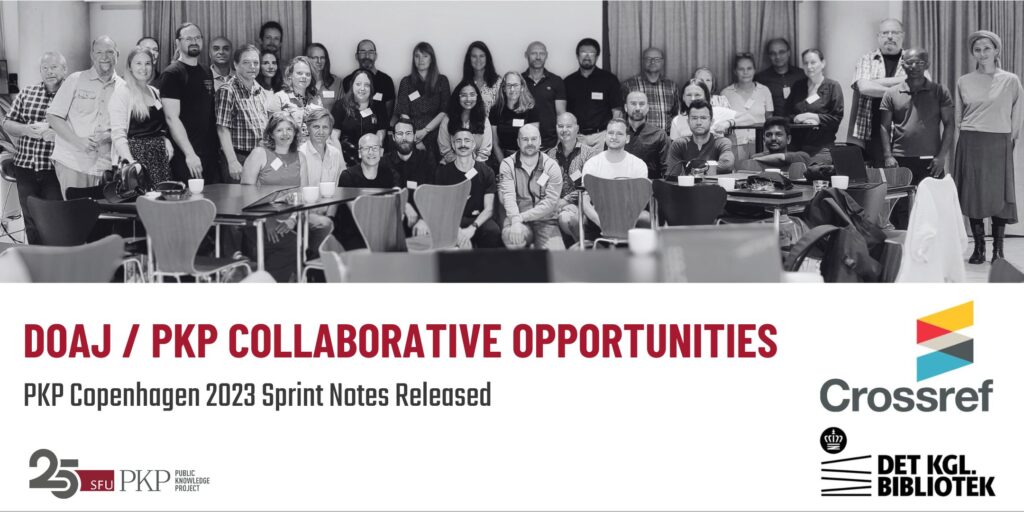PKP Copenhagen 2023 sprint notes released: DOAJ / PKP collaborative opportunities

The second set of sprint notes are now available from the PKP Copenhagen Sprint, hosted by the Royal Danish Library in June, 2023.
Sprints involve PKP community members coming together in diverse groups to work on PKP software and support. The Royal Danish Library hosted eight working groups at the PKP Copenhagen Sprint last June. This is a summary of one such group’s work.
Group members
- Kevin Stranack, Public Knowledge Project
- Emma Uhl, Public Knowledge Project
- Hanna Varachkina, University of Göttingen
- Kat Sundsbø, DOAJ
- Dominic Mitchell, DOAJ
- Susan Collins, Crossref
- Joanna Ball, DOAJ
- Katarina Smitt Engberg, Royal Danish Library
- Ginny Hendricks, Crossref
- Urooj Nizami, Simon Fraser University / Public Knowledge Project
Abstract
The Public Knowledge Project and the Directory of Open Access Journals work to align with fair and open practices and increase trust in open access publications. Those journals and scholarly societies using PKP’s Open Journal Systems (OJS) need to have continuously developed and improved ways to communicate information between OJS journals and the DOAJ. This working group explored in more depth why collaboration between PKP and DOAJ is important and identified some new opportunities. The main results were the brainstorming of a plugin to facilitate OJS applications to the DOAJ.
Background: why is this topic important?
The DOAJ and PKP are aligned in their goals and philosophies around open access publishing. By working collaboratively, the working group can identify opportunities to encourage and facilitate applications to DOAJ by journals using OJS. Lowering the barriers to meeting DOAJ requirements in OJS will allow DOAJ, PKP, and the scholarly publishing community to advance their shared goals.
Goals
- Locate collaborative opportunities between PKP and DOAJ.
- Identify how OJS can facilitate applications to DOAJ through plugins, etc.
- Identify some essential requirements for this type of plugin.
Results
- Brainstormed a variety of suggestions and ideas.
- The dream: a plugin that prepopulates applications to the DOAJ and/or provides reports to the DOAJ info from OJS for ongoing data checks and regular transfers of updated information;
- A wizard that both guides users to fill out OJS fields in a standardized way and enables that info to be extracted into a DOAJ application.
- Scanned each individual requirement of DOAJ applications in order to create a system for envisioning methods of integrating each requirement in-app, and improving existing related fields or in-app help;
- The system could include fields used to examine a series of DOAJ requirements and how (or if) OJS aligns, for e.g.:
- Does OJS facilitate the requirements?
- Is there structured data?
- Can default statements be created to fulfill the requirements?
- Are the requirements basic to DOAJ, OJS, or both?
- Is the requirement a priority for new journals?
- The system could include fields used to examine a series of DOAJ requirements and how (or if) OJS aligns, for e.g.:
- Brainstormed some pitches and opportunities to obtain funding for a project of this nature.
Next steps
- Investigate possibilities for ISSN record crosschecks in OJS.
- Propose some improvements to various fields in OJS, particularly around licensing and copyright notices (incl. clearer direction around the concepts of copyright of published content and copyright of website/journal content e.g. branding).
- Draft some default statement texts that could be implemented in existing or proposed fields.
Thanks
Thank you to the working group for all its effort on importing content into OJS, and for sharing its notes. Our thanks to the Royal Danish Library for hosting the sprint, and to the PKP community, both in attendance at the sprint and elsewhere, for their valuable guidance. We are also grateful to Crossref for sponsoring this event.
